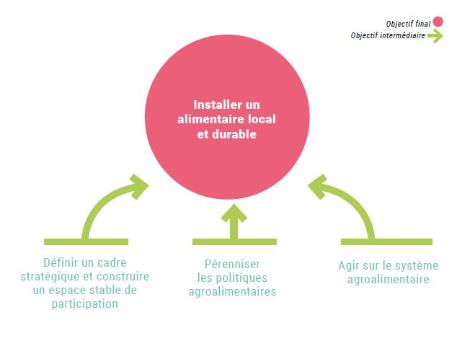Alliances for food governance in Valencia
Participatory strategy in the framework of food policies
January 2019
Fondation Daniel et Nina Carasso (FDNC)
Towards a Europe of territorial food systems?
This study is extracted from the analysis of twenty-two French and Spanish projects related to new food models, all highlighting different challenges.
In Spain, governance is being built, while French food systems are looking for solutions to change scale. But in both countries, accessibility remains the weak link. In Valencia, alliances between social, political and economic actors in Valencia have proved necessary to express demands to sanitise the food system and design the transition path towards its sustainability. In order to achieve this objective, there is a consensus on joint participation in the definition of the challenges facing the food system.
Valencia, Spain
Valencia has a productive peri-urban territory for agriculture, fishing and livestock farming. Over the last twenty years, a significant movement has developed in favour of the defence of the region’s market-gardening plain. The Horta de Valencia, a landscape of irrigation canals, weirs and small dams, provides a framework for quality local food.
PAIPATA
The year 2015 marks the adhesion of the city of Valencia to the Milan Food Policy Pact. This commitment has led to the implementation and deployment of a comprehensive urban food policy. This seeks to build processes of transition towards a fairer, sustainable and resilient food system. The City Council and the Department for Agriculture began by designing an integral action plan for the promotion of the territory and municipal agricultural activity (PAIPATA).

The Integral Action Plan for the Promotion of the Territory and Municipal Agricultural Activity (PAIPATA) is the first instrument of agricultural policy in Valencia, later enriched through a participatory process. Several areas of action are envisaged by the City Council: generational transmission, governance of the municipal food system, improvement of business profitability, promotion of responsible agri-food activity, land use planning, infrastructure, heritage, services and fishing. The driving group is in charge of promoting the project and its dynamics. Based on its composition, representative of the civil society, it multiplies meetings and requests from the different actors of the food chain, in particular the territorial administrations, the productive sector and the civil society.
Sustaining the action
Then they established a broader and more participatory strategic framework, so that this transition process could withstand the effects of political changeover. The development of the municipal food policy has the support of the city council through its recently created department for agriculture, market gardening and villages in Valencia. It is in charge of designing and implementing the strategy for the promotion of agricultural activity and areas dedicated to agriculture. The dynamics of the project relies on other partner actors: Cerai, VSF-Justice alimentaire, the Chair Terre citoyenne and Mundubat. They all form the driving group whose work is to coordinate the main strategy of the project and its lines of action: animation of the food council, market studies and short circuits, studies on public procurement procedures, incubators of agri-food companies, animation of the municipal land bank and media coverage of progress. The project is based on the participation and collaboration of actors who have an influence on the agri-food system: the Mercavalència national interest market, associations, political parties and provincial and regional administrations.
Establishing food governance
Resources are made available to facilitate broad participation and form a food council (Calm): a stable space for participation that invites sensitised people, actors from the conventional sector and different political parties to dialogue. Workshops, meetings and days of exchange are created to draw up a charter of principles and a proposal for regulations for the Calm: the first step in creating alliances is to clarify the rules. Each working group puts forward concrete proposals to feed into the participation process, which also promotes inter-municipal coordination.